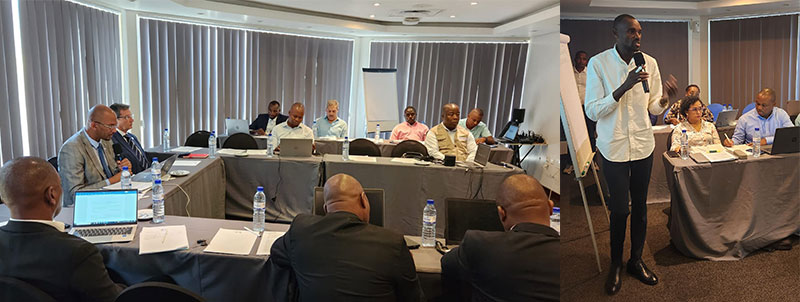Closing two intense training weeks in Mozambique under SFC project

In December 2023, the Smart Fisheries Co-Management (SFC) project successfully conducted two comprehensive training workshops in Mozambique, focusing on capacity development and the evaluation of fisheries co-management effectiveness.
The SFC project aims at building the capacity of government authorities and fishing communities in designing and implementing fisheries co-management systems tailored to the specific contexts of Mozambique. Emphasizing sustainability and aligning with the Blue Transformation roadmap, the project seeks to achieve positive impacts while optimizing human, financial, and environmental resources. The use of continuous feedback and monitoring and evaluation processes play a crucial role in ensuring the effectiveness of co-management systems.
In line with the participatory approach adopted by the Government of Mozambique in the sustainable management of fisheries resources, the SFC project, in collaboration with ADNAP (Administração Nacional da Pesca, IP) and Rare, organized two training workshops at both the national and local levels. These workshops were held 4–7 December 2023 in Maputo, and from 11–14 December 2023 in Vilankulo, Mozambique.
The training workshops were divided into two parts to address different aspects of fisheries co-management: “Co-management of artisanal fisheries”, and “Evaluating the effectiveness of fisheries co-management and Introduction to Ecosystem Approach to Fisheries Management”. Both consisted of five lessons each.
The first part of the training was led by ADNAP. It covered topics related to participatory management and legislative reforms. The second part, conducted by Rare, emphasized the evaluation of co-management effectiveness and introduced the Ecosystem Approach to Fisheries Management (EAFM) concept. The training extended to the field in Vilankulo, providing practical insights and allowing ADNAP to conduct additional sessions.
Approximately 20 participants in each location (Maputo and Vilankulo) attended the trainings, including technicians and fisheries officers from various organizations such as ADNAP, IP, Institute for Fisheries and Aquaculture Development (IDEPA), SPAE (Provincial Services of Economic Activities), DPAP (Provincial Directorate of Agriculture and Fisheries), SDAE (District Services of Economic Activities), Coastal, Lake and River Police, Maritime Administration, Vilankulo Community Partners Association, and NGOs such as Rare and WWF.
The training workshops conducted under the Smart Fisheries Co-Management project mark a significant milestone in advancing fisheries co-management in Mozambique. By addressing critical aspects such as participatory management, legislative reforms, and evaluation methodologies, the project aims to empower stakeholders and foster sustainable fisheries practices.
During the training, some issues and challenges were identified. Fisheries officers from ADNAP and District Services of Economic Activities face the challenge of defining a schedule for the revitalization and restructuring of Fisheries Community Councils (CCPs) benefiting from the project. This process is integral to strengthening participatory management, including the implementation and monitoring of co-management agreements in Vilankulo under the project (for details on CCPs please consult this factsheet).
The recently published New Standard Statute under Ministerial Diploma 131/2022 needs effective dissemination at the site level through CCP structures. Ensuring awareness and understanding of this statute is vital for its successful implementation and integration into co-management processes.
Last, the implementation of the artisanal fisheries licensing strategy by ADNAP is anticipated to significantly increase licensing levels in the coming years. This involves extensive licensing campaigns, the introduction of Smart/Electronic Licensing, and awareness and mobilization of fishers. Aiming for near 100% licensing is a worthy goal, and the success of this strategy relies on coordinated efforts and institutional arrangements, with a clear understanding of the roles of entities such as SDAE and CCPs.
In conclusion, while the training workshops provide a solid foundation for improving fisheries co-management, addressing these challenges is essential to step towards a participatory management and shared decision-making processes. By actively engaging with these issues, stakeholders can contribute to the overarching goal of achieving economic, financial, environmental, and social sustainability in fishing communities in Mozambique.

Representatives from ADNAP during the Maputo training workshop

Participants at the site level training in Vilankulo (left) and Prof. Robert Pomeroy, Rare, during the workshop (right)

